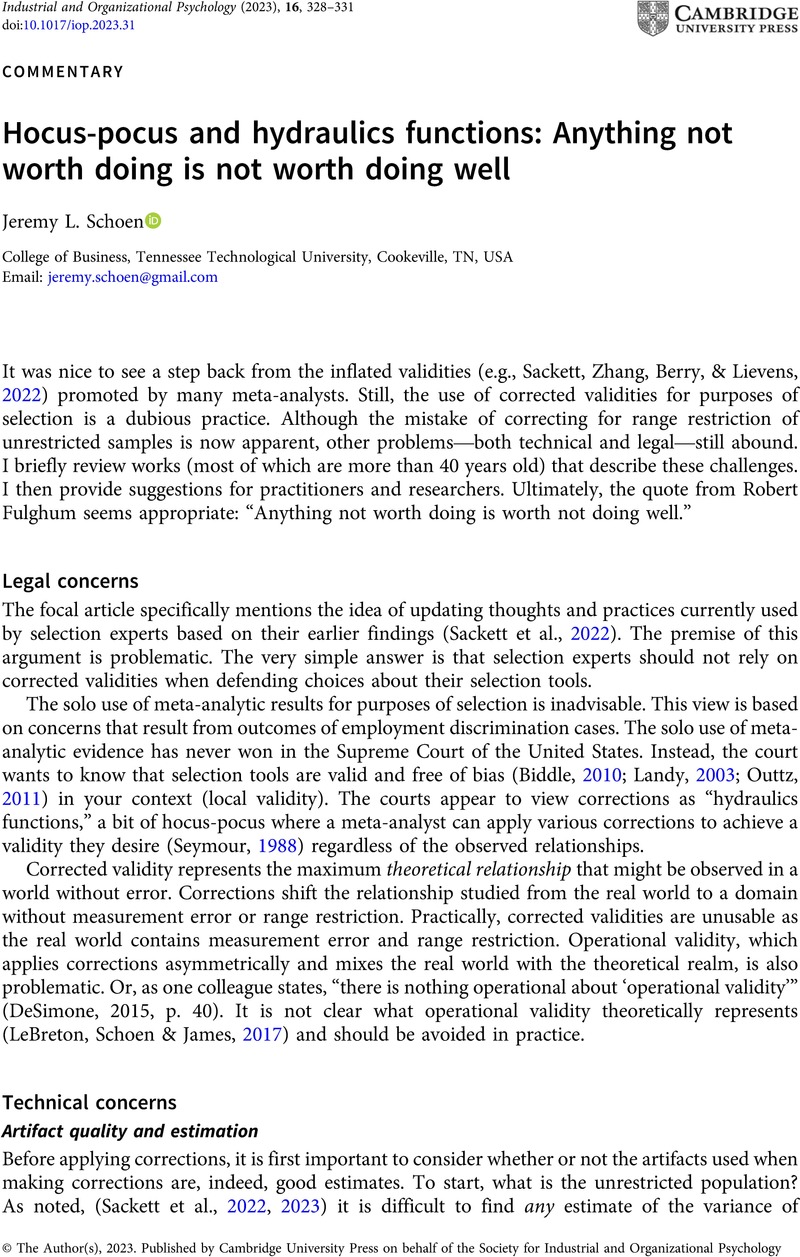No CrossRef data available.
Article contents
Hocus-pocus and hydraulics functions: Anything not worth doing is not worth doing well
Published online by Cambridge University Press: 31 August 2023
Abstract
An abstract is not available for this content so a preview has been provided. Please use the Get access link above for information on how to access this content.

- Type
- Commentaries
- Information
- Copyright
- © The Author(s), 2023. Published by Cambridge University Press on behalf of the Society for Industrial and Organizational Psychology
References
Algera, J. A., Jansen, P. G. W., Roe, R. A., & Vijn, P. (1984). Validity generalization: Some critical remarks on the Schmidt-Hunter procedure. Journal of Occupational Psychology, 57, 197–210.CrossRefGoogle Scholar
Biddle, D. A. (2010). Should employers rely on local validation studies or validity generalization (VG) to support the use of employment tests in Title VII situations? Public Personnel Management, 39, 307–326.CrossRefGoogle Scholar
DeSimone, J. A. (2014). When it’s incorrect to correct: A brief history and cautionary note. Industrial and Organizational Psychology, 7, 527–531.Google Scholar
DeSimone, J. A., Köhler, T., & Schoen, J. L. (2019). If it were only that easy: The use of meta-analytic research by organizational scholars. Organizational Research Methods, 22, 867–891.CrossRefGoogle Scholar
Eysenck, H. J. (1978). An exercise in mega-silliness. American Psychologist, 33(5), 517.CrossRefGoogle Scholar
James, L. R., Demaree, R. G., & Mulaik, S. A. (1986). A note on validity generalization procedures. Journal of Applied Psychology, 71, 440–450.CrossRefGoogle Scholar
James, L. R., Demaree, R. G., Mulaik, S. A., & Ladd, R. T. (1992). Validity generalization in the context of situational models. Journal of Applied Psychology, 77, 3–14.CrossRefGoogle Scholar
Kemery, E. R., Mossholder, K. W., & Roth, L. (1987). The power of the Schmidt and Hunter additive model of validity generalization. Journal of Applied Psychology, 72, 30–37.CrossRefGoogle Scholar
Köhler, T., Cortina, J. M., Kurtessis, J. N., & Gölz, M. (2015). Are we correcting correctly? Interdependence of reliabilities in meta-analysis. Organizational Research Methods, 18, 355–428.CrossRefGoogle Scholar
Landy, F. J. (2003). Validity generalization: Then and now. In Murphy, K. R. (Ed.), Validity generalization: A critical review (pp. 155–195). Lawrence Erlbaum Associates.Google Scholar
LeBreton, J. M., Schoen, J. L., & James, L. R. (2017). Situational specificity, validity generalization, and the future of psychometric meta-analysis. In Farr, J. L. & Tippins, N. T. (Eds.), Handbook of employee selection (2nd ed., pp. 93–114). Routledge.CrossRefGoogle Scholar
Novick, M. R., & Thayer, D. T. (1969). An investigation of the accuracy of the Pearson selection formulas. Educational Testing Service.CrossRefGoogle Scholar
Outtz, J. L. (2011). Abolishing the uniform guidelines: Be careful what you wish for. Industrial and Organizational Psychology, 4, 526–533.CrossRefGoogle Scholar
Sackett, P. R., Zhang, C., Berry, C. M., & Lievens, F. (2022). Revisiting meta-analytic estimates of validity in personnel selection: Addressing systematic overcorrection for restriction of range. Journal of Applied Psychology, 107, 2040–2068.CrossRefGoogle ScholarPubMed
Sackeett, P. R., Zhang, C., Berry, C. M., & Lievins, F. (2023). Revisiting the design of selection systems in light of new findings regarding the validity of widely used predictors. Industrial and Organizational Psychology, 16(3), 283–300.CrossRefGoogle Scholar
Schmidt, F. L., & Hunter, J. E. (2015). Methods of meta-analysis: Correcting error and bias in research findings (3rd ed). Sage.CrossRefGoogle Scholar
Seymour, R. T. (1988). Why plaintiffs’ counsel challenge tests, and how they can successfully challenge the theory of “validity generalization”. Journal of Vocational Behavior, 33, 331–364.CrossRefGoogle Scholar
Sijtsma, K. (2009). On the use, misuse, and the very limited usefulness of Cronbach’s alpha. Psychometrika, 74, 107–120.CrossRefGoogle ScholarPubMed
Yuan, Z., Morgeson, F. P., & LeBreton, J. M. (2020). Maybe not so independent after all: The possibility, prevalence, and consequences of violating the independence assumptions in psychometric meta-analysis. Personnel Psychology, 73, 491–516.CrossRefGoogle Scholar


